ANNUAL REVIEW

INTEGRITY - RESPECT - LEARNING & INNOVATION - INCLUSIVITY
2020-2021
Published by Hibiscus Initiatives Resource for London, 356 Holloway Road, London, N7 6PA, United Kingdom

First published 2021 © Hibiscus Initiatives hibiscusinitiatives.org.uk
This publication is copyright, but may be reproduced by any method without fee or prior permission for teaching purposes, but not for resale. For copying in any other circumstances, prior written permission must be obtained from the publisher, and a fee may be payable.


Design: Silvia Berastegui & Keira Johnson with Prospectus
Cover image: painting created by the women at the Women's Centre
To protect the privacy of individuals, some names and identifiable characteristics have been changed.
2 | HIBISCUS
WELCOME TO HIBISCUS ANNUAL REPORT 2020 – 2021
A MESSAGE FROM THE CHAIR AND THE CEO ABOUT US, OUR MISSION AND VALUES ELENA’S INSPIRING STORY OUR TEAMS’ RESPONSE TO COVID-19 HIGHLIGHTS OF THE YEAR BLACK LIVES MATTER CASANDRA’S INSPIRING STORY COMBATING TRAFFICKING OLA AND ADA’S INSPIRING STORY LEARNING FROM OUR WORK WHAT WOMEN THINK ABOUT OUR SERVICES
DALILAH’S INSPIRING LETTER OUR IMPACT IN NUMBERS INFLUENCE AND CHANGE –CULTURAL MEDIATION REPORT
ALMA’S INSPIRING STORY INFLUENCE AND CHANGE –CLOSED DOORS REPORT
YOLANDE’S INSPIRING STORY OUR PEOPLE LOOKING AT THE FUTURE FINANCES OUR FUNDERS
| 3 ANNUAL REVIEW 2020-2021
5 6 8 10 11 14 16 18 19 20 21 22 23 24 26 27 28 29 30 32 33 34 CONTENTS

4 | HIBISCUS
through the long journey, with the help of wonderful ladies, I built dreams and plans for the future again...
“ “
WELCOME TO HIBISCUS ANNUAL REPORT 2020 - 2021
When I first met Monica (Hibiscus Project Worker), I was hopeless, depressed, alone, and in a very dark place mentally and physically. As I was escorted to her tiny office, I thought on my mind, “here we go again.”
I was tired of meeting people, going back and forth to the same question:
“Was it real everything you told about your trauma?”
I went to meet Monica, not knowing she will become one of the most supportive and vital people in my life. I always get scared and anxious about meeting new people. I was shaking while I was called to go to her office. Then there she was, with the brightest smile.
Weekly appointments with her became so important to me, not only because she was helping me with the paperwork I needed at that time, but seeing her, made me feel safe. She never asked questions to make me feel uncomfortable; she was so caring and helpful.
Before I was released, I remember Monica explaining how Hibiscus had so many activities for women at their centre. I thought I would never become a part of it, as my case has always been complicated, but fortunately, I did. I have taken part in so many courses that have helped me in every way. In one of the courses, I was asked;
“What is your dream?”
I didn’t have an answer for it. I didn’t see a future, studies, or career; therefore, I was scared to dream of anything.
But through the long journey, with the help of wonderful ladies, I built dreams and plans for the future again.
Thanks to Hibiscus, I am now doing a journalism course.
Before lockdown, I changed into a person that was busy and had hope. It improved my mental health so much.
Lockdown has had an extremely high effect on my depression, but I know it’s been a challenge to everyone. Even during that period, Hibiscus has tried its best to offer diverse courses online, and these magnificent ladies have continued supporting us as always. I cannot wait to be able to come back to the Hibiscus usual as before.
I’ll never forget for Christmas party (2019) when I gave Monica a card, she gave me a hug. I felt so valuable and worthy. I wanted to cry of happiness. Knowing our stories, I always felt that everyone would feel disgusted to touch us. She has seen me breaking down and she has made me smile.
I
Hibiscus without Monica in mind; she has saved my life, which maybe she doesn’t even know it. Thanks a lot to Hibiscus for doing so much to support vulnerable women.
Thank you for having people like Monica on your staff and thank
Mbali - March 2021
| 5 ANNUAL REVIEW 2020-2021
can’t talk about
you for helping and giving hope to women like me.
“
“
A MESSAGE FROM THE CHAIR AND THE CEO
2020 was an extraordinary year, when the unthinkable happened. Families struggled with the COVID-19 pandemic and personal loss. Charities struggled with loss of income and a huge demand on their services. The killing of George Floyd and rising inequality renewed difficult conversations around the world about race, diversity and inclusion. For the marginalised communities Hibiscus works with these issues are intersecting, and the impact of both have driven our clients to become more marginalised in our society, and our work more necessary.
Our staff, trustees and volunteers have shown tremendous resilience, responsibility and resolve to support our clients and one another. We are incredibly proud of them. The way we work may have changed because of the pandemic, but we never stopped serving the women, men and families we work for in the community, detention, prisons, Courts and those who have returned home. Hibiscus have been innovative in the way we work to ensure continued services; this has meant finding new ways of supporting our clients. We set up a successful free telephone service at HMP Peterborough, so migrant women can keep in touch with us. Hibiscus also supported those who were released from detention into the community during the height of the pandemic. We were able to provide singing and sewing workshops online and held online events during Black History Month and International Women’s Day.
The pandemic has impacted the mental wellbeing of our clients, and we were pleased to work in partnership with Nafsiyat and the Maya Centre to secure therapy support for our clients. Looking after our staff wellbeing continues to be important to us and especially when all of us are working from home and the need from our clients is so great. We were very pleased to have secured Trauma Treatment International to provide supervision for all staff.
The vision on which we are rooted, ‘a fair and just society where inequalities are eliminated from the criminal justice and immigration systems’, has become even more relevant this year as inequalities widen across society, with
the most marginalised communities struggling for fairness. In the last year the death of George Floyd has motivated us to reflect more on the structural racism experienced by our clients, and how we show up as an organisation. With the support of external consultants, we have had conversations within Hibiscus about equality, diversity and inclusion and what this means for our work. We are pleased that Hibiscus has signed the anti-racism charter developed by End Violence Against Women coalition. We know we cannot solve this challenge alone, and that’s why we continue to hold conversations with other organisations about tackling systemic racism and the impact it has on our clients.
As policies become more hostile towards migrants, and the need for our services increase, we recognise we can no longer deliver services only, but we need to challenge systems that lead to inequality in the criminal justice and immigration systems. This means raising awareness about the issues experienced by our clients and advocating for policy changes. Over the past year we have held two successful report launches. The ‘Closed Doors’ report evidenced the inequality of access to safe accommodation to survivors of trafficking, while the ‘Cultural Mediation’ report demonstrated how our cultural mediation project working with Albanian women had a positive impact. The media coverage of the ‘Closed Doors’ report in The Guardian and Politics helped to amplify the voices of our clients. We have become more visible on our social media network and have increased our Twitter and Instagram following.
6 | HIBISCUS
One of the highlights for us this year has been organising a virtual roundtable discussion with eight women with lived experience of the Criminal Justice System, to speak to Lyn Brown MP and share with her their experiences and what they would like to see changed in the system. Working with other staff to create the space was fantastic. With the creation of the new Head of Policy and Public Affairs role, this work will be something we will be strengthening next year.
While the pandemic has crippled many charities financially, Hibiscus was able to secure full funding for the year. With a strong drive to raise money to directly support our clients through the pandemic, we were able to secure over a quarter of a million in COVID-19 funds, which provided staff with equipment and training to adapt to home working as well as enabling us to give direct support to women and their families to buy food, clothing, and other necessities to cope with the pandemic. We have brought in new funders including Paul Hamlyn Foundation and Barrow Cadbury Trust, to fund our work at Hibiscus.
At the end of 2020, we said farewell to our CEO, Adrienne Darragh, who had led the organisation with commitment, knowledge, and a steady hand over her six years in post. Our longstanding trustee, Liz Hogarth OBE, who brought such a wealth of experience also stepped down from the Board. We take this opportunity to thank Adrienne and Liz for everything that they gave to creating the organisation that Hibiscus is today.
After an extensive search process that focused on diversity of skills, experiences and backgrounds, we were delighted to announce the appointment of Marchu Girma as our new CEO and to introduce four new board members with expertise in law, policy, HR and fundraising to strengthen our organisation. We have also recruited a new member of the senior leadership team, Hazel Alcraft, as Head of Community and Prison Services.

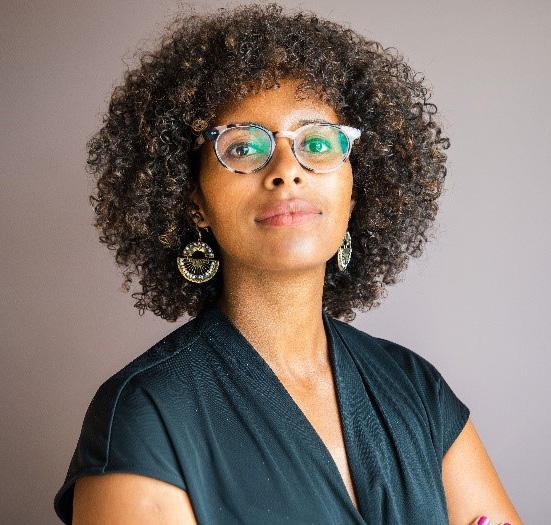
Despite our resilience, we are not immune from risks. The ongoing pandemic, government policy changes in the criminal justice and immigration systems and the negative view of the public about migrants will continue to impact on the work we do. Having a strategy is one thing; being able to execute it, especially in times of great unpredictability, is something else.
We thank our staff and trustees for showing up and continuing to be dedicated to social justice. At Hibiscus we have a proud tradition of integrity, innovation, inclusivity and resilience that provides us with confidence about the future. As the pandemic becomes under control, our staff and volunteers are excited to go back to centres and reconnect with our clients.
Rachel
(Chair) and Marchu Girma (CEO)
| 7 ANNUAL REVIEW 2020-2021
Sincerely,
Youngman
Rachel Youngman (Chair)
Marchu Girma (CEO)
ABOUT US, OUR MISSION AND VALUES
About us
Hibiscus is the UK’s leading organisation working with Black, minoritised and migrant women and families at the intersection of the immigration and Criminal Justice systems. Our work over 35 years has afforded us unrivalled understanding of the intersecting and compounding disadvantages, challenges, and vulnerabilities experienced by our clients.
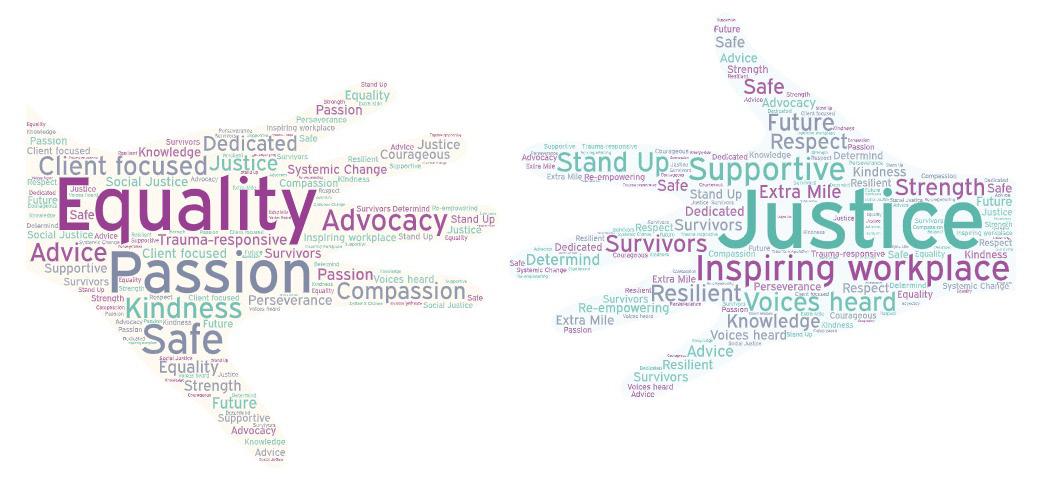
The communities we work with face multiple barriers to justice such as racism, xenophobia, trafficking, gender-based violence and destitution, which place them at-risk of re-traumatisation and being re-exploited.
Our work spans across the community, prisons, Courts, and within detention and international resettlement settings. This, along with our specialist, holistic intervention method of working, grants us a unique sectoral perspective.
8 | HIBISCUS
• Our Practical Support workstream involves specialist casework and tailored support around housing, immigration, entitlements, and legal issues.
• Our Wellbeing workstream provides emotional, mental and psychosocial support, to enable clients to address the trauma they experienced.
• The new Empowerment & Agency workstream creates opportunities for clients to develop agency and empower themselves to change their lives and participate in opportunities to influence systemic change by using their voice and experience.
• This is supported by our Influencing department where we partner with the clients, to provide them the skills and expertise they need to develop as lived experience leaders. We create platforms where their voices can challenge inequalities and influence change.
Our strategy - The 5 R's
From 2021-2023 Hibiscus is focusing our work on five strategic themes - our 5 R’s - to ensure that we become a more impact-led, traumainformed and client-centred organisation. Over the next two years we will:
• Recover from the impact of the pandemic on our clients, staff and programmes
• Build the Resilience of the organisation
• Recentre those with lived experience to partner with us for systems change
• Reconnect to our past and celebrate 35 years of making a difference
• Reimagine the future of Hibiscus, in our fight for justice and equality
Our values
Social justice
We are committed to social justice. We aim to impact positively on the lives of our clients.
Integrity and Respect
We work with integrity, respecting the diversity of our clients, to overcome inequality of access to social justice.
Learning and Innovation
We promote a culture of learning and innovation
Inclusivity
We promote a culture of inclusivity for everyone in our organisation.
Our goal for 2022
We will be a stronger clientcentred organisation excelling in the delivery of responsive, innovative services, working collaboratively, and influencing policy and research in the UK and internationally.
| 9 ANNUAL REVIEW 2020-2021
Our work at the grassroots level encompasses three intervention methods:
ELENA’S INSPIRING STORY
My Autumn, My Queen
Just like a tree with many leaves Sorrow and joy Caught between branches A string of golden days Such is the life of man, a branch of the tree
One leaf is falling
Taken by the wind
Looking back today, my heart is becoming small and My soul is crying. But who am I? A branch
A leaf in the wind, flying to a star? Or even lightning?
A flying thought A tree all over the earth. But what I was and who am I?
A passer-by, A leaf in the wind
A planted tree A holy me, a voice A soul, a word.
Elena - November 2020
Elena was born into a large family from a destitute area in Romania. While in school, she loved poetry, but never thought about writing. Elena always wanted to leave and search for a better life and worked hard for her dreams.
In the UK, Elena met the wrong people and became involved in criminal activities. While in prison, she had time to contemplate her life and, through poetry, she tried to feel connected to her mum and rediscover herself.
Hibiscus first met Elena in court in February 2020. We supported her by providing translation services, emotional support and financial assistance while detained in HMP Bronzefield.

10 | HIBISCUS
OUR TEAMS’ RESPONSE TO COVID-19
Community Services to Women
Our community team provides specialist, trauma-informed support to Black and migrant women affected by the Criminal Justice System, immigration restrictions and/or survivors of trafficking, across the Greater London area.
Due to the COVID-19 pandemic, our Women’s Centre in Islington remained closed for the duration of the 2020-21 financial year. Staff continued individual casework and emotional support for clients remotely using a variety of communication channels. We continue to see a high level of need from women accessing casework support, with immigration decisions and Tribunals delayed due to COVID-19, and consequent impact on women’s practical situations, mental and emotional health.
Hibiscus organised group and 1-1 activities, focusing on three overlapping strands of practical support, wellbeing and empowerment and agency, using online video technology.
Emergency COVID-19 grants from a number of funders allowed us to provide hardship grants to clients most in need of support. This assisted with basic needs including food vouchers, clothes, baby and children’s provisions, utility bills, electronic devices and data top-ups, to enable access to the internet and participation in Hibiscus activities.
Wraparound and Diversion Services
We have continued our Wraparound and Diversion services providing holistic specialist support to migrant women in contact with the Criminal Justice System. This is in partnership with MOPAC, Advance, Women in Prison and the South London Women’s Alliance.
Throughout the pandemic, women who accessed these services reported feeling safer from genderbased violence and abuse and saw their health and wellbeing increase as a result of the support they received. Being able to access counselling and GP advice services via telephone also had a positive impact on Hibiscus Wraparound clients being able to access support.
Westminster Magistrates’ Court
Funded by the National Probation Service, this project aimed to identify and support vulnerable migrant women appearing at Westminster Magistrates’ Court. The project became heavily impacted by COVID-19 and the introduction of virtual hearings. Our project workers were unable to work from the Court building, and there was a substantial decline in referrals, partly due to a reduction in the number of migrant women appearing at the court. Despite these challenges, we successfully completed assessments with 119 women appearing at the Court, 29 of whom were referred for ongoing support from Hibiscus’ prison, community, or Immigration Removal Centre teams, before the project closed in March 2021.
Specialist Advocacy and Advice Services to Women in Prisons
We currently continue to work in three prisons, HMP Bronzefield, HMP Peterborough and HMP Downview. The extended lockdown has been extremely difficult for women in prison, with little time outside of cells or limited access to activities, no visits from family and delays in support services. Hibiscus staff were unable to attend any prisons in person for the majority of the year, due to the COVID-19 restrictions, but support has been provided remotely via phone, letter and using the ‘email a prisoner’ service. In HMP Peterborough the prison facilitated free phone calls for women to call our project worker via a dedicated free PIN. This proved beneficial, with a large number of calls received and new clients engaging.
Funding secured from Comic Relief provided additional support to clients affected by genderbased violence. This was delivered via information packs sent to women in prison, since in-person workshops were not possible.
“The support provided to me definitely helped in my financial aspect since the pandemic, and since I came home life has been really hard.”
| 11 ANNUAL REVIEW 2020-2021
International Resettlement and Detention Services
Our focus remains on supporting those within detention, as well as our clients that have been released into the community due to COVID-19. This focus has been especially evident at Yarl’s Wood. During the pandemic, many of our clients were released and Hibiscus worked together with other agencies to ensure that these women received support. We offered over the phone emotional and practical assistance and referred clients to other charities in the community. The emergency support provided by Hibiscus has been invaluable in supporting those released and we are now focusing on a sustainable support system, including working with partnership agencies both in the UK and abroad.
In Heathrow, a number of our clients were transferred from prison and are awaiting deportation within the Immigration Removal Centres. We have also increased our presence in the Sahara Unit to support women who were detained for short periods of time. Undocumented migrant cases have been supported with referrals to legal aid and other avenues of support during this difficult time. Additionally, we have provided emotional support and returns counselling, particularly on health and safety concerns related to COVID-19.
We have been working with other agencies, Home Office and Public Health to ensure both the safety of those we support and of our staff, ensuring we are always understanding the complexities of returning.
Specialist Support Services to Families Facing Forced Removal
Due to the pandemic, the PDA has been closed to families. Staff have therefore been assisting with training new officers, including developing a training package that has been delivered to staff within the centres. We have also been working on updating policies, procedures, and feedback methods to ensure the best outcomes for the families once the service resumes. The PDA staff have been updating leaflets and partnership work ensuring collaboration and information gathering ready for service delivery. A new resource package of Third Country Unit booklets has been created to offer information to those who are being returned to EU countries under third country case regulations.
Specialist Welfare Services to Women in Immigration Removal Centres.
The Specialist Welfare Services (SWS) has been offering a hybrid service within Yarl’s Wood Immigration Removal Centre and to those who have been released. During the last year, the centre has been repurposed at various times of the year and therefore SWS has adapted their way of working with the women.
The COVID-19 pandemic has put an increased strain on clients we work with, both inside and outside of detention. This has resulted in more frequent communication with clients, ensuring their wellbeing and mental health is being supported. Our team have been using therapeutic intervention and calming techniques to provide clients with coping mechanisms in this difficult time.
Where we have not been able to hold face-toface group work with the women, we have found suitable alternatives such as making individual wellbeing packages to help with their self-care and positivity.
SWS have also been assisting with post-release work, including those who are referred to our service prior to release. We have been able to provide direct support to those released in the community, instead of referring to other agencies. Examples of what we have assisted with include: financial help with mobile top-ups, shop and food vouchers and assisting with job searches.
12 | HIBISCUS
“The support I get from Hibiscus is very beneficial to me and really helps me to be able to stay positive and stay home. I like every support I receive from hibiscus.”
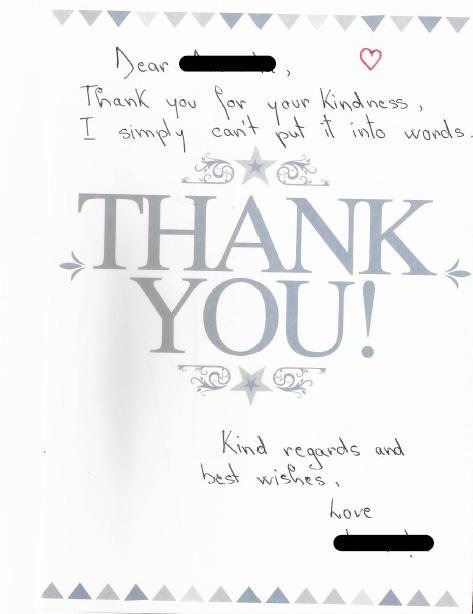
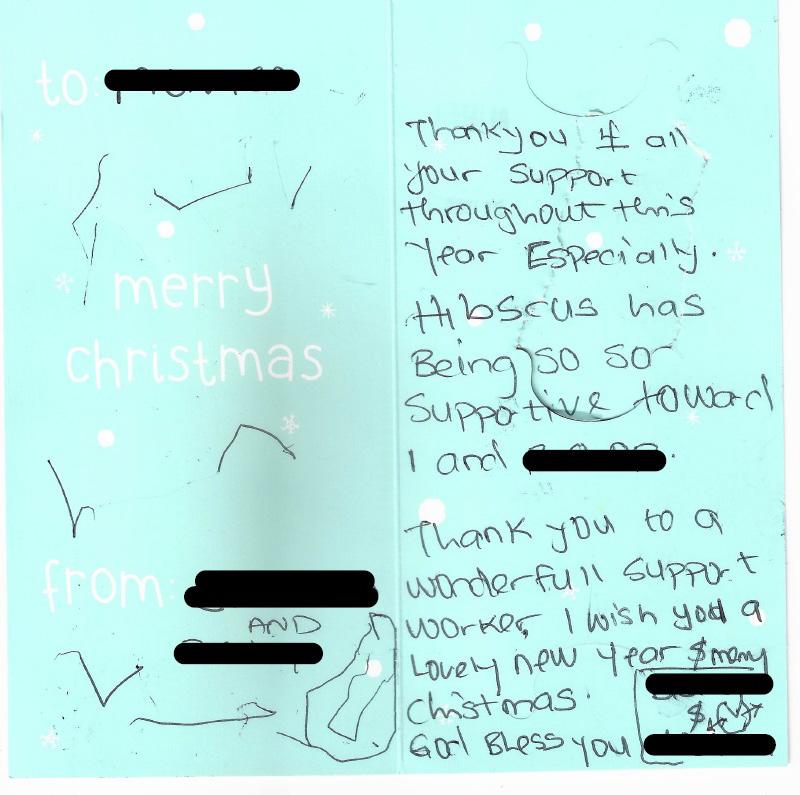
| 13 ANNUAL REVIEW 2020-2021
Thank you cards written by clients in HMP Bronzefield in November & December 2020.
HIGHLIGHTS OF THE YEAR
April 2020 May 2020
Transition to working from home: Began remote service delivery for community and prison clients and adapted the international resettlement services in the Immigration Removal Centres to provide ongoing support to those released into the community.
Commencement of the Anti-Trafficking Steering Group: Members of all teams participate to move forward with Hibiscus’ anti-trafficking strategy.
COVID-19 emergency funds: Provided emergency funds for women in the community to help provide basic needs and connect to the new virtual environment.
June 2020
Online coaching sessions: Started 1:1 coaching sessions online with the women.
Black Lives Matter statement: Announcement of the statement to support the global Black Lives Matter movement in condemning the racist killing of George Floyd and to fight against the racism experienced by Black people around the world.

Resume services within Immigration Removal Centres: Resumed services and face-to-face support inside Immigration Removal Centres.
December 2020
Closed Doors report launch: Launched the Closed Doors report which was presented online with over 100 attendees.
Hibiscus’ December party: Provided gifts for the women and their children with the help of The Salvation Army and Winter Toy Appeal project (Local Buyers Club).
London Women’s Services Alliance launched: Partnering with 10 specialist women’s organisations to deliver improved support for women and girls in contact with the Criminal Justice System in London.
January 2021
New board members: Welcomed Rosalyn Akar, Anne Langton, Klara Skrivankova and Annette So.
Re-Run donation: Trainers and fitness clothing were distributed to our clients in detention and community to promote wellbeing through fitness.

14 | HIBISCUS
LET’S CELEBRATE HIBISCUS’ MILESTONES!
July 2020
Online activities for the women: Restarted some of the Women’s Centre group activities online such as ESOL, yoga and singing.
October 2020 November 2020
Intercultural Therapy Services: Secured a new partnership with Nafsiyat and the Maya Centre to offer therapy services for women in the community.
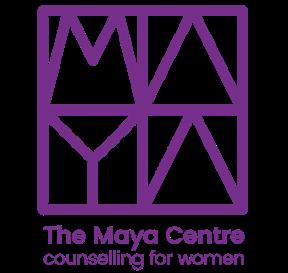
New CEO: Welcomed Marchu Girma, the new CEO of Hibiscus.
New Head of Community and Prison Services: Welcomed Hazel Alcraft as our new Head of Community and Prison Services.
Protea Clinic: Monthly Protea Clinic restarted online, providing free immigration advice to clients, in partnership with King’s Legal Clinic and Hammersmith and Fulham Law Centre.

Ethnic disparities and inequality in the UK: Responded to a call for evidence by the Commission on Race and Ethnic Disparities.
February 2021 March 2021
Comic Relief project: Completed an internal evaluation of a Comic Relief-funded project delivered by Hibiscus, that aimed to improve support for women affected by gender-based violence.
Client’s voices: Attended a Roundtable with Lyn Brown MP and women with Criminal Justice System experiences.
Celebrated Galentine’s day in Yarl’s Wood: Clients received wellbeing pamper packages including positivity journals, pens, beauty face masks, chocolates, reading books and themed word searches.
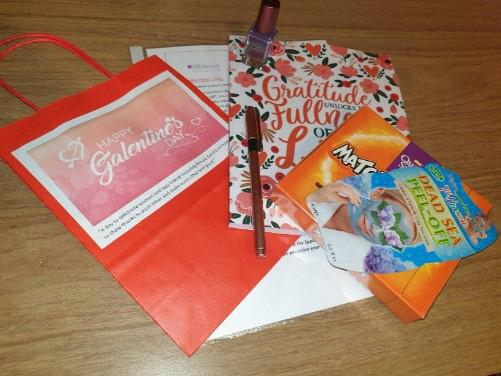
Violence against women and girls strategy: Responded to Home Office consultation on the new VAWG strategy, highlighting the need for a distinct response to the additional vulnerabilities faced by minoritised and migrant women.
Cultural Mediation research report launch: Launched a new report highlighting the benefit of a cultural mediation approach to working with survivors of gender-based violence.
International Women’s Day: Celebrated the day with an online event which many of our clients participated in. The Specialist Welfare Services project delivered an ‘Inspirational women’ focused quiz and gave individual snacks and prizes to our clients in detention.
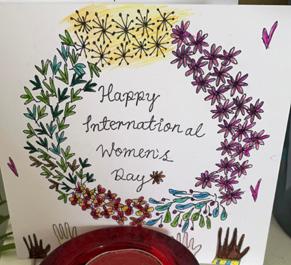
Westminster Magistrate’s Court project: Successful ending to the project, meeting our target to support 120 women appearing at the Court.
London Legal Project: Joined a collaborative partnership aiming to support survivors of trafficking to access their legal entitlements.
| 15 ANNUAL REVIEW 2020-2021
BLACK LIVES MATTER
At Hibiscus, we continue to support the global Black Lives Matter movement. We were heartened to see George Floyd’s killer was held accountable for his actions when handed a guilty verdict.
The fight against racism experienced by Black people around the world is a long journey and justice for George Floyd is a milestone on the long road ahead. Martin Luther King Jr. reminded us that “the arc of the moral universe is long, but it bends toward justice.” Change takes a long time, but it does happen.
At Hibiscus, as an organisation providing specialist services to Black and migrant women as well as to men in detention, who are most likely to be impacted by systemic racism in the UK, we continue to be committed to working towards a fair and just society without racism.
Hibiscus re-affirmed its commitment to this work by signing up to the End Violence Against Women’s (EVAW) anti-racism charter, and to achieving actions set out including, centring antiracism in our work, representative leadership and governance, and disrupting power and influence. Reflecting on the past year, here is what we have done towards our anti-racism agenda:
Centring anti-racism in our work
• We published our commitment to Black Lives Matter on our website and developed an action plan to centre anti-racism work.
• We have made anti-racism a core part of our organisation’s strategy. We developed our 5R strategic themes (recovery, resilience, recentre, reconnect and reimagine). The strategic themes ‘recentre’ and ‘reconnect’ focus on the lived experiences of Black and migrant women and addressing the systemic racism, discrimination and inequality they experience in the criminal justice and immigration systems.
• We have secured funding to support our anti-racism work. Specifically, we secured funding from the Barrow Cadbury Trust for our Doubling Down on Double Disadvantage project. This funding will support us to develop a robust action plan highlighting the double disadvantage Black and migrant women experience in the Criminal Justice System.
• We facilitated a roundtable discussion between Black women with experience in the Criminal Justice System and Lyn Brown MP. We will continue to enable and give a platform to Black women to speak about their experiences and bring decision makers to the table.
Representative leadership and governance
• We held workshops with external consultants to enable deep and reflective conversations on anti-racism and white privilege with our senior leadership team and Black staff members.
• Hibiscus has created space for Black staff members to meet to regularly discuss the impact of racism in the work they do. Hibiscus is proud to support the development of such a space.
• Recruitment of a diverse board that represents those we work with is important. We recruited four new trustees with diverse backgrounds in December 2020, meaning the diversity of our Board was greatly improved and 50% now identifying as Black or minoritised women. We have also been part of the Beyond Suffrage programme, which is currently supporting women with lived experience of the Criminal Justice System to become trustees.
Disrupting power and influence
• We submitted our response to a call for evidence from the Commission on Race and Ethnic Disparities, towards their consultation on the ethnic disparities and inequality in the UK.
• Hibiscus is a member of Female Offender Minority Ethnic (FOME) working group established by the Ministry of Justice (MOJ). We have highlighted the issues of systemic racism in the Criminal Justice System in this group and will continue to work with the MOJ and other stakeholders to begin to address this problem.
16 | HIBISCUS
A poem written to share the experiences of Black staff members working at Hibiscus with clients who are impacted by systemic racism in the UK.
A daily struggle, fighting to have our say How wrong it is to be treated this way Because we are black We will not give up We will not stop We are proud Because we are black
I’ve been compelled to be strong When I can hear murmurs about my physical appearance Don’t want to be asked how I feel Everything hurts, especially today
Unable to breathe in a space with you
Forced to point out wrongs for you
Then gazed upon strangely, then deemed irrelevant
As my eyes roll, I stumble across shadows of a rainbow Is it hope?
You are a reflection of me and I am a reflection of you Only separated by arbitrary Home Office rule
You are my father, mother, sister and brother
You are me caught at the invisible border
This is not a job, a workplace, a money-making adventure This is me ensuring you and I have a future
Your freedom is my freedom
So I will sing songs for us
Whilst your voice has been silenced
Until we are all free Until our harmonies roar again
| 17 ANNUAL REVIEW 2020-2021
CASANDRA’S INSPIRING STORY
Thank you for all the care you have with me. You can’t imagine how grateful I am for all the support you’ve been giving me. I’m very anxious with the arrival of the letter [from the Home Office]. I crochet to de-stress myself whenever I can. I think it’s a great idea to teach others. I’m happy to be useful for something since you guys helped me so much. We would need needles of different sizes and threads for the activity. In this case, I think that if we do it with knitted yarn, it would be more economical and with them, women can make everything, from home objects to accessories such as a purse for example.

“
Casandra had made plans in Brazil to study and become a lawyer, but first she needed to work to earn some money to pay for her studies. She worked as a hairdresser and became experienced in styling and modelling. Casandra met some people who promised her a job in the UK where she could earn a better income, but they lied to her about this and forced her to work in the sex industry as soon as she arrived in the country. Casandra became trapped and did not know how to escape as her traffickers threatened her, kept her locked in a room and stole her passport. Police eventually found the apartment where she was being held captive and released her.
After being released, Casandra became fearful as she did not know the country at all or know how to access support and accommodation. The police referred her to Hibiscus for assistance. Hibiscus worked with Casandra to find ways she could access legal advice and representation, in order to move forward
with her immigration case in the UK. Casandra wishes to stay and start a new life here, free from her traffickers. She needs time to recover from her past experiences and is still waiting to receive a Conclusive Grounds decision from the National Referral Mechanism (NRM).
During the pandemic, Hibiscus spoke with Casandra about activities that could help her cope with feelings of stress and challenging situations. She mentioned that knitting and crocheting have helped her the most in the past. These activities reminded Casandra of her previous hairdressing work, as some of the hand movements are the same. Hibiscus sent a wellbeing pack with different coloured yarns so that Casandra could knit and crochet at home.
Casandra found this very therapeutic and made different items and art creations. She is now preparing an activity to teach other women to crochet in our Women’s Centre.
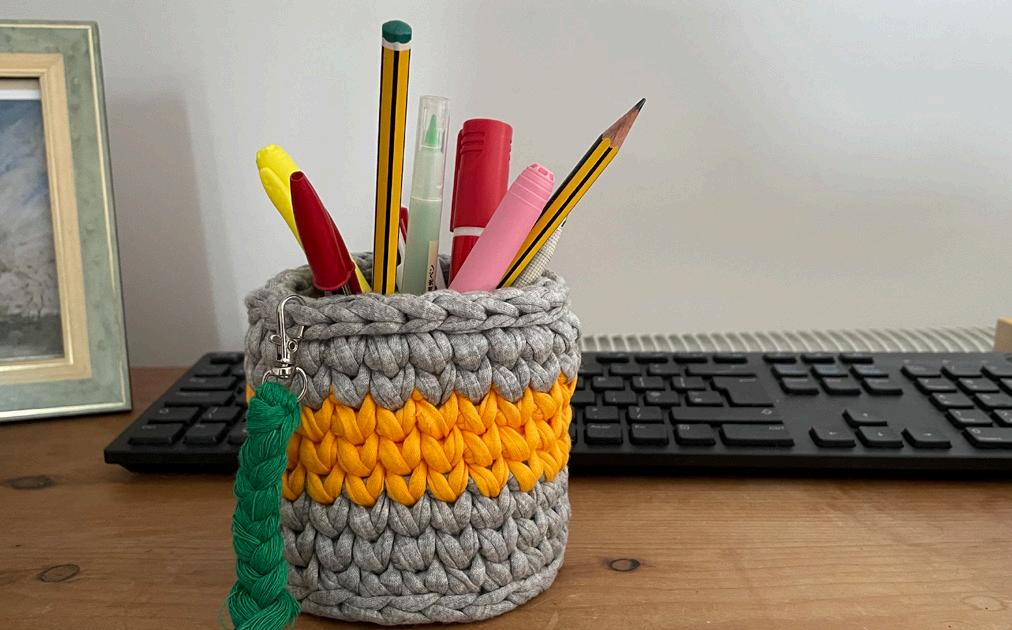
18 | HIBISCUS
“
COMBATING TRAFFICKING

We strive to contribute to the prevention of human trafficking across the globe and to be recognised nationally and internationally for our expertise and practical work with survivors by:
• Providing day-to-day practical support services for survivors of trafficking.


Training all our staff on anti-trafficking so that we
can always recognise and respond effectively to the needs of potential survivors.
• Researching and assisting others to research and promote anti-trafficking and the rights of survivors.
• Developing partnerships with organisations nationally and internationally to share good practices and promote prevention across the globe.
Thank you very much for all the help I always receive from the entire Hibiscus team, and what you do to help people like me, who are victims of trafficking. Your support helps us to move forward, even when we have many physical and psychological scars that we will carry through the rest of our lives, I’m just thankful to you.
*CG: Conclusive Grounds decision - A positive CG means that the person has been formally recognised as a victim of trafficking by the Single Competent Authority (SCA) in the National Referral Mechanism (NRM).
| 19 ANNUAL REVIEW 2020-2021
5% of our clients inside Immigration Removal Centres 151 CLIENTS with trafficking concerns 7% of our clients in
56% of our clients in the community 58 with positive CG* 30 awaiting decision 23 with negative CG* We
prisons
supported a total of
Our anti-trafficking goal for 2024
“ “
OLA AND ADA’S INSPIRING STORY
“Ola and Ada started engaging with Hibiscus four years ago. Hibiscus met Ola in prison, while Ada was referred from an anti-trafficking organisation. In the initial contact, assessments were carried out with each of the women to determine the key details of their situation and of their presenting needs. They both met the criteria for the activities and sessions being delivered by Hibiscus as part of the Comic Relief gender-based violence project and were willing to participate in it.
Ola and Ada were offered places in the psychoeducation group sessions. The group offered therapeutic sessions to address specific challenges and ways of coping for women affected by gender-based violence, as well as focusing on strengths, resources and skills to improve health and wellbeing on a long-term basis. When they first joined the group, the sessions already had a regular group of women who had established a safe space
where experiences and support were shared. In one of the sessions, Ola disclosed that she was having flashbacks from a procedure carried out on her as a child that she had never talked to anyone about before. Discussions within the group led to Ada also sharing her experiences of a similar situation. Hibiscus project workers offered Ola and Ada the opportunity to discuss this further and the idea of FGM was explored with them. Ola shared that she had never thought of this as a harmful practice and Ada said that she also never thought that it was something that constitutes violence against her.
After this, the women continued to attend the psychoeducation sessions but were also interested in seeking support from a specialist FGM organisation suggested by Hibiscus. In the end, Ada decided not to go ahead with the support offered by this organisation, whereas Ola continued in the process to get an assessment by them.”
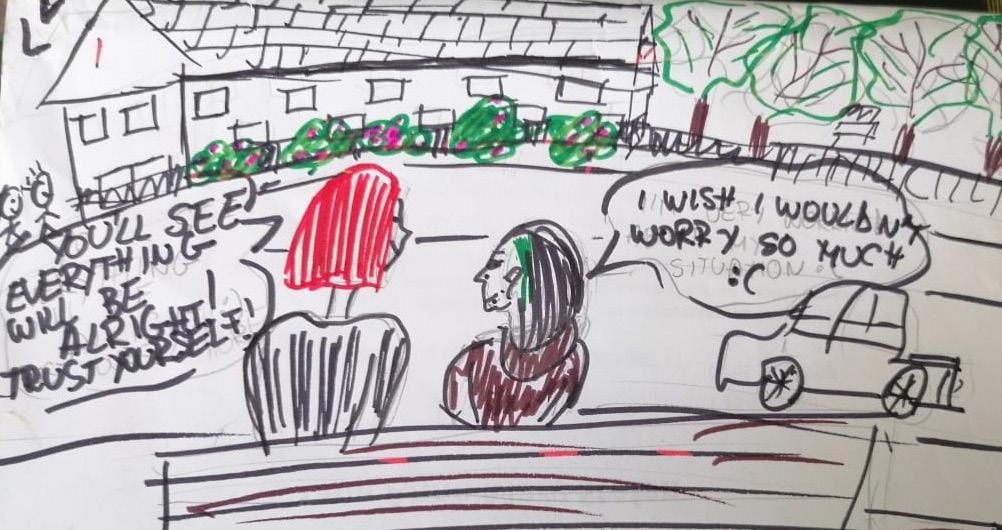
20 | HIBISCUS
Drawing made by a client in front of the Crown Court on May 2020, while awaiting the second part of her case management hearing.
LEARNING FROM OUR WORK
Breaking Down Barriers for Foreign National and BAMER Women Impacted by Gender-Based Violence - A project funded by Comic Relief
This year saw the above 2-year project draw to a close and, since then, Hibiscus have been reflecting on its findings and considering the ways that the outcomes of the project can, and should, influence the future support service offered to the women we work with.
The project provided almost 300 women who have been affected by gender-based violence with 1:1 support and group sessions, from the prisons in which we work and from the safe community space provided by our Women’s Centre. The support sessions were specifically targeted to address their additional needs and delivered in a therapeutic and trauma-informed way.
The aims of the project were to help women increase their understanding and awareness of abuse, to positively impact their wellbeing and to build their confidence to make choices about their futures. Additionally, Hibiscus aimed to strengthen organisational knowledge about the barriers faced by women affected by genderbased violence, to develop future support and influence best practice.
Many other benefits were seen through the course of the project including Hibiscus staff deepening their knowledge of cultural barriers associated with those who have experienced gender-based violence and how cultural norms can discourage or prevent disclosure. These insights helped to form the Cultural Mediation project for Albanian women who have survived trafficking, along with an in-depth report around the benefits of cultural mediation. The project also highlighted the need for culturally appropriate therapy and counselling, leading to a partnership with the NAFSIYAT and the Maya Centre.
“…we’ve learnt how important it is to go at woman’s pace - creating a safe, nonjudgemental space for them to reach out when they are ready.” – Hibiscus project worker
The COVID-19 pandemic meant Hibiscus staff and skilled session workers adapted sessions and activities to deliver them online. This new way of service delivery made activities more accessible for some women but less accessible for others. Hibiscus will be looking to incorporate a variety of methods of service delivery to reach more women in need for future projects.
By using a survivor-centred approach within this project, Hibiscus staff found that they can do much more than support women to access services; they can help women heal, gain independence, and re-establish power and control over their lives.
Key lessons learnt:
• Women benefitted from the combination of practical support, wellbeing activities and empowerment, and we are now using these 3 themes to plan our activities for women coming to the Women’s Centre.
• The restrictions created by COVID-19 meant we had to explore different models of delivery (groups and 1:1 sessions, in-person and online) and saw how each can benefit different women; this has informed our decision to continue offering both remote and face-toface support options in future.
• The evaluation highlighted challenges in gathering consistent feedback from our client group, especially when working remotely. In the coming year we will be conducting an impact review to explore how we can best measure and understand our impact given these challenges.
97%
of women who made use of the service reported improvements in one or more of the following: their understanding of abuse and their options, their wellbeing and/or confidence and self-efficacy levels.
| 21 ANNUAL REVIEW 2020-2021
WHAT WOMEN THINK ABOUT OUR SERVICES
"You have been the best to me here, you have helped me a lot. Hibiscus has helped me a lot. This is the only service I can’t complain about. It’s true that we couldn’t meet in person, but it was only because of the coronavirus. When I call you and you don’t answer, I know it is because you are busy in a meeting or with someone else, and you can’t do anything to change that. I always tell the women here - you should call Hibiscus; they will help you. If they have the chance, will do anything they can to help you. "
“The support has been absolutely invaluable, particularly as I have a lot of problems coping with things due to my mental health, and there are a lot of channels that Hibiscus can navigate that I cannot as a layperson as such.”
“Hibiscus helped me and supported me a lot during all this time. I’m currently on probation and they provided language support to help me communicate with my probation officer. They have arranged all my appointments, and for every problem I know who to call.”
“I will recommend Hibiscus. I needed emotional support and a little bit of immigration advice. Hibiscus did help me when I needed support emotionally and with other stuff. They did a follow up when I arrived. I felt very much supported, and I’m glad, after all the trauma I am facing, that there are some people out there who are always having a heart for people.”
“I am finding the support from Hibiscus a great service. Support from the team has had a great impact on my life and family. Thanks again to the team and my support worker.”
22 | HIBISCUS
DALILAH’S INSPIRING LETTER
Dear Sir or Madam
My name is Dalilah. I am a client supported by Hibiscus. I would like to use this opportunity to express my sincere gratitude towards the help I received from this organisation, Hibiscus, during the pandemic.
It has been a very rough time for me since I came out of detention last year. I have been receiving support from Hibiscus both physically, physiologically, financially e.g., money for food, phone top ups, transport to see my kids and buy snacks for them, and clothing.
It was a big help to me, especially as I’m not permitted to work or access benefits at all. It helped ease off stress at the time.
Thank you so much for your help and putting up a smile on so many people face. Hibiscus has really given me hope that things will get better!
I always receive phone calls and text messages checking to make sure I am okay, especially during my weakest moment when I have been going through mental health issues. Anytime I’m low in mood and call, Hibiscus is always available to give listening ears.
Thank you to all the staff of Hibiscus for their tremendous support.
Dalilah
April 2020
Our team’s support
During the early stages of the COVID-19 pandemic, many of our clients in the Immigration Removal Centres were released to suitable accommodation to control the spread of the virus. Hibiscus had to adapt to this new dynamic and, although the support was initiated within the centres, we developed new ways of working with the released clients in the community by providing ongoing practical and emotional support over the phone.
Needs such as referrals to food banks, supermarket vouchers, clothing, access to healthcare, COVID-19 testing, information on social distancing and government updates, housing, legal representation and immigration advice were some of the key areas in which our clients needed support.
This support continued throughout the height of the pandemic and clients reported feeling at ease knowing we were there to support them.
| 23 ANNUAL REVIEW 2020-2021












24 | HIBISCUS OUR IMPACT IN NUMBERS Hibiscus supported a total of: Main areas of need: 1. Finance 2. Health 3. Housing 4. Immigration 5. Education, training and employment 40% participated in activities 17% were supported in the community due to COVID-19 Main areas of need: 1. Wellbeing 2. General advice 3. Emotional support 4. Clothes 5. Health 843 CLIENTS from April 2020 to March 2021 515 CLIENTS supported in the Immigration Removal Centres 209 CLIENTS supported in the community 119 CLIENTS supported in prisons
COVID-19 has made it harder for us to reach the people who need our support. Due to the pandemic, this year we have:
• A decrease by 16% in the number of clients assisted in the community.
• A decrease by 71% in the number of clients assisted in the Immigration Removal Centres (including Specialist Welfare Services) due to being released into the community and a reduction of return flights.
• A decrease by 41% in the number of clients assisted in prisons as COVID-19 restriction prevented access to HMP Bronzefield and HMP Downview.
(Compared to the previous year, 2019-2020)
Thanks
•
•
•
•
•
•
•
*Data from Community and Prison Services team between May 2020 and January 2021.
“I am very grateful. The phone seems to work pretty well, I like it. Many thanks to you and to all at Hibiscus for your support!”
“I have received all of the clothes for my child and jeans for myself this morning. I really appreciate that and richly bless you. Thank you.”
“I have received my books and trainers with the socks, thank you so much, I love them. God bless you.”
“It is a very different feeling now that me and the kids have our own space. A very big thank you from the bottom of my heart goes to you for everything you have done for us. Thank you for the Asda voucher too, you have a golden heart as we say in Albanian when someone has a good heart like you."
“I am so amazed at what you do! Guess what? I just got the fridge-freezer today; can’t thank you enough, I am overwhelmed. THANK YOU.... Thanks once more and in advance for all that you do.”
| 25 ANNUAL REVIEW 2020-2021
to the COVID-19 emergency funds, we provided*:
87 baby
clothes,
pushchairs
medicines)
and children’s provisions (including vouchers for
nappies, prams,
and
149 top ups for mobiles
internet
and
credit
45 mobile phones
tablets
and
316 supermarket vouchers
credits
utilities
45
and funds for
and bills
32 wellbeing packs
161 hardship support (for example funds for emergency accommodation, furniture, household essential items, gift cards, winter clothes and transport cards)
INFLUENCE AND CHANGE
Cultural Mediation report











Cultural Mediation - an inclusive solution to help reduce the cultural and language barriers experienced by survivors of trafficking.
The women we support are faced with day-today barriers, one of which is language. Evidence shows that 95% of women in the National Referral Mechanism are migrants many of whom will face language and cultural barriers in the way of their access to justice. Over a period of six months, we found that by using cultural mediation techniques we can not only improve language barriers but cultural understanding too, as well as increasing the confidence experienced by migrant women who are survivors of trafficking.
What is Cultural Mediation?



Cultural mediation is a tool used to overcome language and cultural barriers. As a cultural mediator you are expected to be much more than an interpreter, rather an expert at finding equivalences between languages, a person who shapes the exchanges between two or more cultures and social systems for those cultures and is consistent with their respective value systems.
This technique has been used in Europe to improve communication, understanding and access to services for newly arrived migrants. This technique creates a smooth transition for migrants and promotes integration into societies by overcoming these cultural and language barriers and, at the same time, allowing migrants to familiarise themselves with the system.
CULTURAL MEDIATION

Throughout this project we worked with 16 women. We found that women required more than an interpreter to help them navigate the systems. Through cultural mediation, we have managed to create a space for better understanding and integration. We did this by using a survivor-centred approach, validating women’s experiences, and centring their needs. By listening and working with women, we were able to create a safe space, where women would build confidence and create agency.
Through cultural mediation, we can further improve women’s understanding of the systems they are faced with in the UK, supporting them to use their voice which empowers them to reestablish power over their lives. Most importantly, the great advantage of cultural mediation is that it is a holistic approach which could be used and adopted in the wider sector such as healthcare, education, public services, immigration offices and the social sector, to ensure access to services for migrants who are new and/or do not understand the system - an approach which is beneficial for all.
26 | HIBISCUS
An inclusive solution to help reduce the cultural and language barriers experienced by survivors of trafficking
Authors: Blodina Rakovica & Dr. Sara Ianovitz
ALMA’S INSPIRING STORY
Alma is 33 years old, a survivor of trafficking and mother of two. Prior to coming to the UK, Alma was forced into marriage, abused and mistreated by a man she did not want to marry. After Alma left her hometown, she was further victimised, being passed from one abuser to another, eventually being trafficked to the UK. After some time in the UK, Alma was granted refugee status. Although this meant that she could access more support and rebuild her life, she was still healing from the wounds.
As a refugee, it was still difficult for Alma. The struggles were still present despite the recognition. Alma was still facing difficulties in accessing services due to language and cultural barriers, therefore she was often provided an interpreter. On one occasion, Alma was allocated a male interpreter. She explained to the male interpreter that she has an Albanian speaking project worker at Hibiscus who was already assisting her. The male interpreter was dismissive, abrupt, and stated that there is no need for another interpreter and that he was there to interpret. Alma stated that she would like to speak to a female interpreter instead.
“I did not want to speak to him about my private life, because of my experience I find it difficult to speak to men… he then said to me what’s the difference if it’s a man or a woman... he just didn’t understand.”
Alma felt distressed and misunderstood after the meeting. She requested to speak with her female project worker who was familiar with her case and understood the language and culture.
“I didn’t want to offend anyone, I just wanted to let them know that a woman from an organisation that speaks Albanian has offered to help me with this. A big deal was made that I requested you, by the end of it I just wanted to finalise what I had to do and not complicate the matter further and leave.”
Alma was rightfully frustrated and upset. She wanted someone she could trust to provide the language support. Although, she had a right to request this support, she still expressed a feeling of regret for requesting that her Hibiscus project worker interpreted instead.
It was not appropriate for Alma to be allocated a male interpreter; it is not suitable when translating for survivors of trafficking, for their interpretations to be from the gender of those that had abused them. In a sensitive relationship with a gendered power dynamic, the client would have felt differently if a woman who was familiar with her case and understood her culture and language, could have supported her instead.
After listening to Alma’s concerns, the project worker tried to ensure that Alma is not faced with such situations again.
“Previously I was missing this kind of support and finally I got it from you, and I will never forget that."
| 27 ANNUAL REVIEW 2020-2021
INFLUENCE AND CHANGE
Closed Doors report
An overview
The need for physical shelter is an essential requirement for people who have experienced trauma, such as trafficking and exploitation. If a survivor is homeless or is living in poor or unsafe accommodation, they may be vulnerable to targeting by both new and familiar perpetrators of abuse, exploitation, re-trafficking and other forms of further harm. Everyone referred to the National Referral Mechanism (NRM) as a potential survivor of trafficking is entitled to “secure and appropriate” accommodation in a safe house while their case is considered.
This is part of the UK’s legal obligations under Article 12 of the European Convention on Action against Trafficking (ECAT) and should be a priority for support providers. However, as this report shows, there are some significant gaps in the provision of, and injustices within, the government funded support services, particularly around suitable accommodation.

CLOSED DOORS
Only 2% of Hibiscus’ clients referred to the NRM were allocated a place at a safe house.



Findings of the Closed Doors report:
• There are not enough safe house beds to meet the needs of the number of people going through the National Referral Mechanism (NRM).


The vast majority of female trafficking survivors from overseas are housed in asylum accommodation when they are meant to be placed in safe houses, meaning they are facing inequalities because of their immigration status.
Asylum accommodation is unsuitable and unsafe for the 45-day reflection period which those who have been identified as potential trafficking survivors are entitled to receive. This places trafficking survivors at risk of re-traumatisation, reexploitation and re-trafficking.
• Too many people go missing after being recognised as potential victims of trafficking by the National Referral Mechanism (NRM).

28 | HIBISCUS
Change recommendations:
Inequalities and injustices in appropriate and secure housing provision for female victims of trafficking who are seeking asylum Modern Slavery Victim Care Contract:
new
must include explicit policies and procedures to
Training for those delivering services: Comprehensive training for people who work with
by trafficking
Appropriate and secure accommodation: Provision of accommodation for victims of trafficking must reflect the need to be appropriate and secure,
Strengthened monitoring and accountability mechanisms: Clearer mechanisms must be implemented to ensure survivors of
and
can
deliver services.
The
MSVCC
address failings and gaps under the current contract.
those affected
during initial needs assessments and in accommodation settings.
in line with Article 12 of ECAT.
trafficking
survivors’ groups
challenge failure to
YOLANDE’S INSPIRING STORY
answer on her section 95 application involving support and housing from the Home Office. SWS also sent Yolande some emergency funds to buy essential food for that day and completed an online food shop to provide her with food for the next few weeks. We also let her know if she did ever want to report her partner for the abuse, it is her decision and that we would support her if/when she is ready to do that.
Yolande first approached the Specialist Welfare Services (SWS) in Yarl’s Wood, remaining a client until her release. She got in touch with SWS in April when she was in the community and, since the pandemic, she has stayed in touch weekly for ongoing assistance.
Yolande recently had the strength to inform us that she had experienced abuse at the hands of her partner whom she was living with upon her release. Through building a rapport with this client via weekly contact and regular emotional support, Yolande was able to confide in us of her recent change in circumstances over the Christmas period. Her partner had separated from her and left her alone in the flat they were renting. Due to being an asylum seeker and not entitled to work, as well as not being in supported accommodation, Yolande found herself in a predicament. She had very little to eat as she was too embarrassed to ask for help and she also expressed suicidal ideations due to feeling low and isolated, therefore the SWS staff increased their contact to provide additional emotional support.
SWS assisted Yolande in receiving support from Migrant Help; they have since had a successful

Things slowly appeared to be looking on the brighter side but Yolande then acted on a suicidal ideation. She informed Hibiscus of this when she was back home and safe, but she felt there was little help put in place to safeguard her after the incident. Over the next week, Hibiscus called Yolande daily and sent a safeguarding alert to her local GP asking for another referral to be made for a mental health assessment. With Yolande’s input, Hibiscus created a care map for her to refer to, with a list of who she can contact to help with each concern. By including her church group, friends and supporting organisations in the plan, Hibiscus have shown her that she is not alone in her situation.
Thanks to our emergency COVID-19 funding, Hibiscus have also sent a second wellbeing pack that included reading books, African beads, positivity cards, a prayer journal, diary and pens. These compliment her expressed hobbies and interests.
“Hi, I have just received my wellbeing pack, thank you very much I really appreciate all the help I receive from Hibiscus. Your calls are comforting, and I look forward to hearing your voice. You make me feel happy.”
| 29 ANNUAL REVIEW 2020-2021
OUR PEOPLE
Our trustees
Rachel Youngman (Chair), Michael Greenwood (Treasurer), Anne Langton, Anne Stephens, Annette So, Erika-Maria Szasz, Klara Skrivankova, Liz Hogarth, Louise Swan, Margaret Crisell, Rosalyn Akar, Roz Morrison and Sara Khan.
Our staff
Marchu Girma (CEO), Chloe Geoghegan (Director of Operations), Hazel Alcraft (Head of Community & Prison Services), Louise Hatch (Head of International Resettlement & Detention Services), Abdul Ahmed, Aleksandra Stankova, Amanda Williams, Amy Mills, Blodina Rakovica, Elena Brihan, Izabela Ignatowska, Joanne Potter, Julie-Anne Ntege, Julie Shaw, Juste Marcinkeviciute, Katrina Struthers, Keira Johnson, Kelly O’Sullivan, Kerry Smith, Mercy Chieza, Monica Ortiz, Rakie Ceesay, Seika Aziz, Shmailish Anwar, Silvia Berastegui, Simona Blaj and Waseem Saghir.
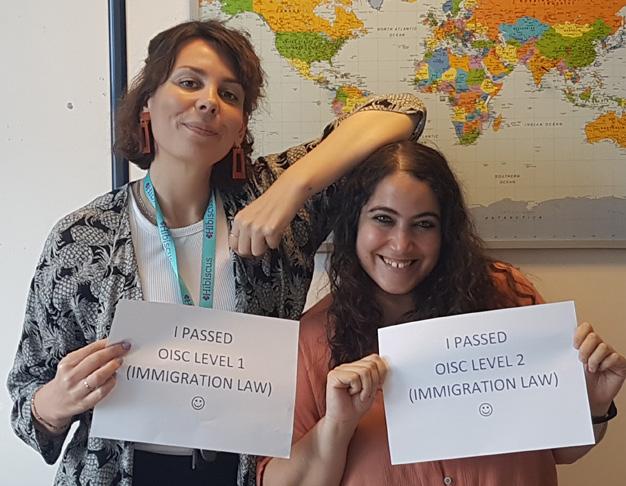
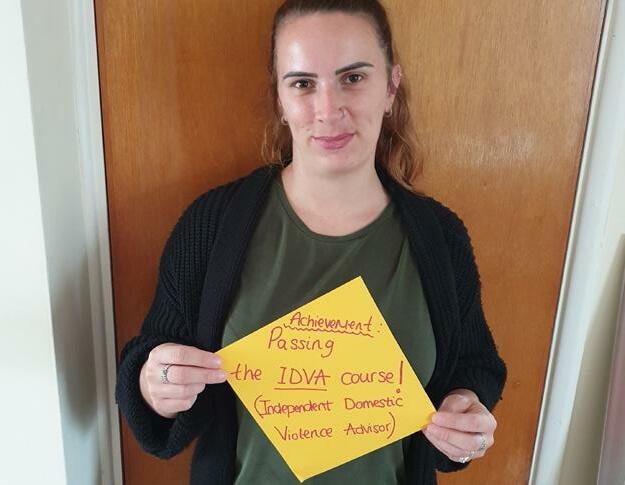
Celebrating our achievements
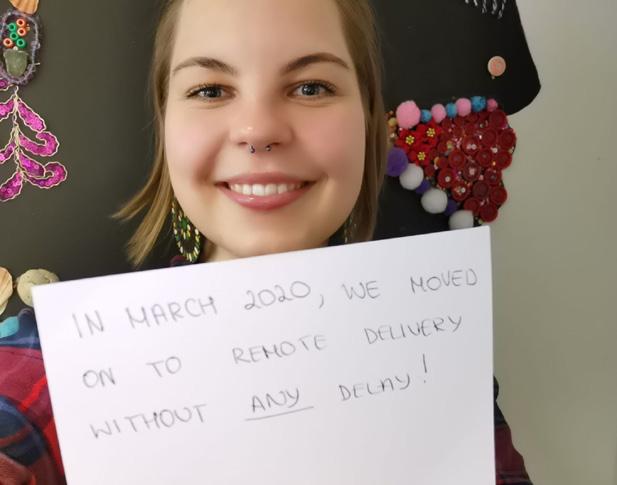
When the lockdown restrictions eased, Hibiscus organised an opportunity for staff to meet in pairs, enjoy a hot drink and catch-up after a long period of working from home.
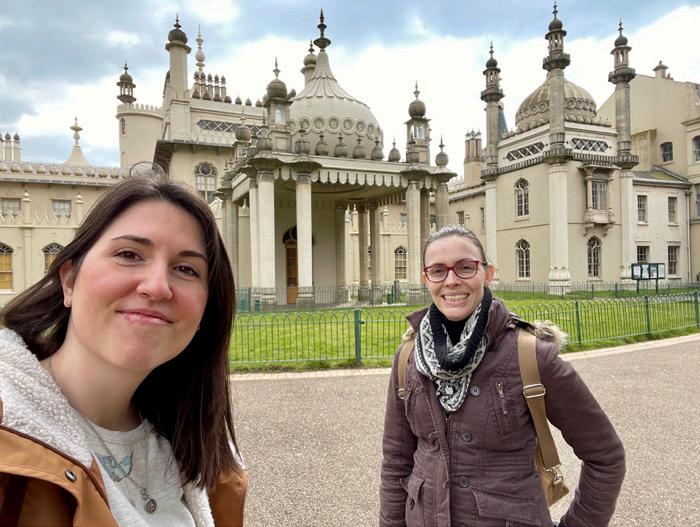
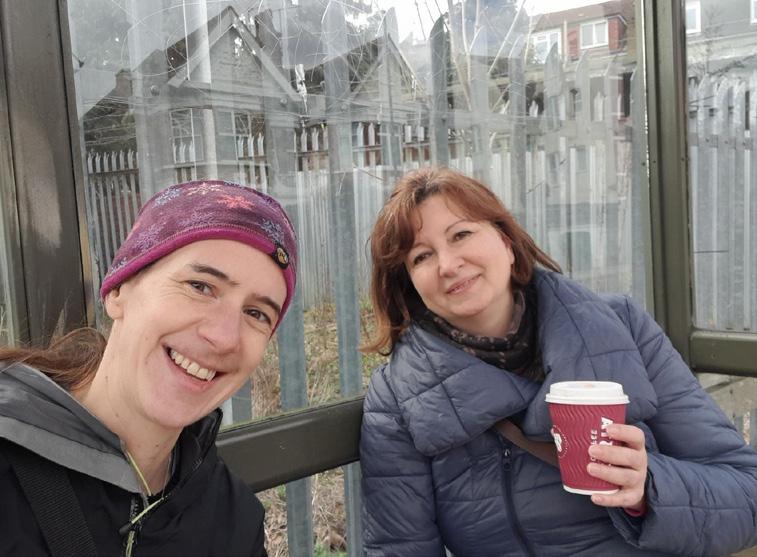

30 | HIBISCUS
Our team continuously stay up to date on new training.
This year Hibiscus staff members completed a variety of training:
All staff: Frontline staff: Operations staff:
• Safeguarding
• GDPR
• SharePoint
• Outlook
• Teams
• Anti-racism workshops
• Safeguarding for Call Handlers
• Three members of staff received a qualification to become Independent Domestic Violence Advisors (IDVA)
• 4 members of staff passed OISC Level 1
• 1 member of staff passed OISC Level 2
• Level 3 diploma in counselling
• Anti-trafficking
• Project management
• Change Management Foundation and Practitioner training
• Employment Law Update - to strengthen internal HR capacity
• Monitoring, Evaluation & Learning with INTRACto help the organisation become more impact led
What has been difficult and challenging for you during this year?
"Not seeing clients face-to-face"
"Couldn’t visit our families in the UK or in other countries"
"Dealing with mental health problems"
"Struggling with technology and bad internet connection"
"Creating a safe environment while working remotely"
"Working very long hours"
"Finding ways to keep moving and keep fit"
"Concerns about clients’ health and their access to support and services"
"Losing loved ones"
"Clients not being able to see each other in-person and connecting over activities"
"Dealing with new challenging scenarios for Hibiscus and our clients" "Supporting clients affected by trauma and abuse on the phone"
"Missing seeing colleagues and social interaction in real life"
"Adapting to rapidly changing Government guidelines"
| 31 ANNUAL REVIEW 2020-2021
LOOKING AT THE FUTURE
Hibiscus celebrates its 35th anniversary in 2021.
Launch of the Empowerment & Agency workstream to develop lived experience leaders.
A new strategy is being developed to create a more impact-led and client-centred organisation.

Refocusing our attentions on recentering Black women and their voices within our programmes, projects and within our external policy and advocacy work, to contribute to the fight towards creating a stronger anti-racist society.
Redeveloping the website to reach more clients and partners and to grow Hibiscus’ influence.

Launch of the new Salesforce Case Management System to improve outcomes for clients and to better evidence our impact.
Welcome

Recovering services, re-opening the Women’s Centre and establishing new hybrid models to work with clients in-person and remotely.
Monitoring the impact of Brexit and the changing immigration restrictions, while looking for ways to respond as a sector in order to secure migrants’ rights and combat their inequality of experience.
New Head of Policy & Public Affairs, to focus our effort on systemic change.
32 | HIBISCUS
35
Hibiscus
Unrestricted funds Designated funds Restricted funds
Total 2021 Total 2020
Notes £ £ £ £ £
Income from: Donations and grants 2 - - 578,808 578,808 367,993 Charitable activities 3 795,662 - - 795,662 875,993 Investments 96 - - 96 269 Total 795,758 578,808 1,374,566 1,244,255
| 33 ANNUAL REVIEW 2020-2021
FINANCES
Expenditure on: Raising funds 5 18,849 - - 18,849 16,276 Charitable activities 6 737,702 - 601,378 1,339,080 1,146,778 Total 756,551 601,378 1,357,929 1,163,054 Net income/ (expenditure) 4 39,207 - (22,570) 16,637 81,201 Transfers between funds 17/18 (17,857) 15,872 1,985 -Net movement in funds 21,350 15,872 (20,585) 16,637 81,201 Total funds brought forward 17/18 416,839 207,513 44,561 668,913 587,712 Total funds carried forward 438,189 223,385 23,976 685,550 668,913
OUR FUNDERS
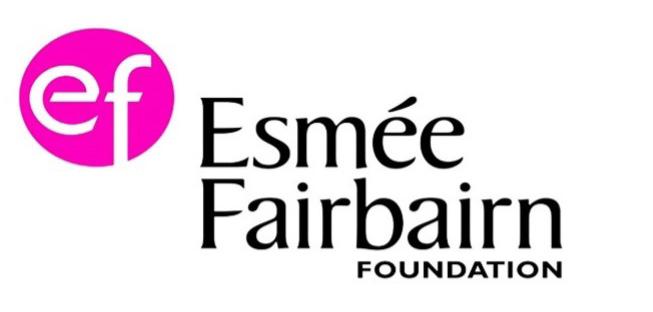


We would like to extend a thank you to our funders for their continuous support, especially during a difficult year.
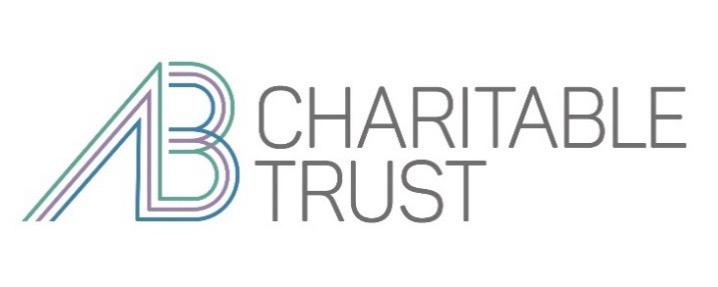
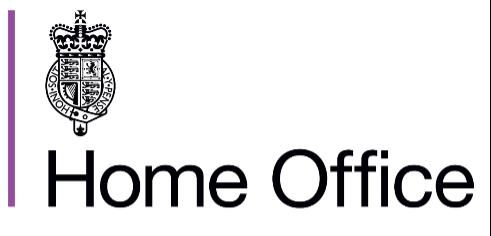

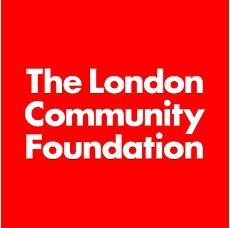
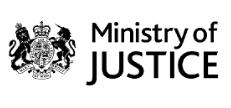
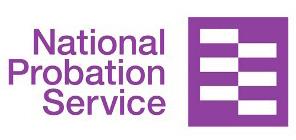

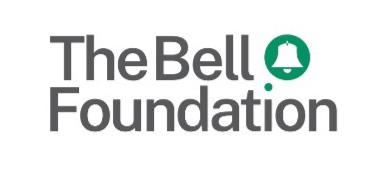

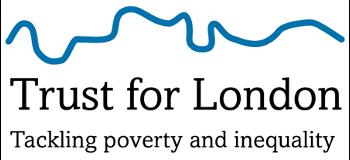
34 | HIBISCUS
36 | HIBISCUS Published by Hibiscus Initiatives Resource for London 356 Holloway Road, London, N7 6PA United Kingdom 0207 697 4120 info@hibiscus.org.uk @hibiscuscharity First published 2020 © Hibiscus Initiatives hibiscusinitiatives.org.uk Hibiscus Initiatives Limited is a registered charity no. 1104094 and a company limited by guarantee, registered in England no. 4533442























































